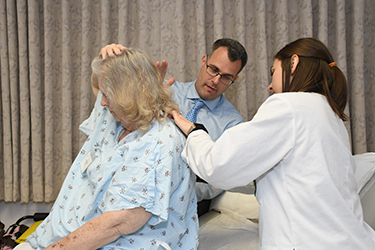by Alex Martirossian, MD, PGY-3

Thinking back to the bygone days of medical school, many of us were taught with the aid of Bates’ Guide to Physical Examination and History Taking, learning the principles of how to perform a perfect physical exam. But reflecting on our own performance, how many of these exam skills have we actually mastered? Listening for a wheeze or assessing for lower extremity edema may be a breeze, but how about localizing a neurologic deficit or pinpointing the exact etiology of a patient’s shoulder pain? In his time working with medical students and residents, Dr. Stephen Russell, an Associate Professor in the Division of General Internal Medicine, observed a lack of confidence in physical exam skills that was quite prevalent among medical trainees.
Fuelled by his desire to enhance physical exam training, he sought to study this problem by distributing a survey in 2015 which asked residents to rate the quality of physical exam training they received from teaching faculty. He also collected data from faculty on how effective they felt their teaching was on acquiring physical exam skills. The survey unveiled an interesting discrepancy in that the faculty thought they were teaching plenty about physical exam skills whereas residents reported that they weren’t getting enough.
Dr. KeAndrea Titer, a former chief medical resident and now Assistant Professor in the Division of General Internal Medicine, also shares a passion for enhancing physical exam skills, so she teamed up with Dr. Russell to do something about it. The results of the survey were presented at the poster competition during the UAB Research and Innovations in Medical Education (RIME) week. Later with the aid of a generous stipend from the Wallace Foundation, the Enhanced Clinical Skills (ECS) Track was born. The ESC Track is designed to be a residency track for Internal Medicine residents that provides them extra opportunities to enhance their skills in the physical exam and bedside ultrasonography. Much of the curriculum drew inspiration from the Stanford 25 Skills Symposia, annual meetings that bring clinicians from across the country together to learn about enhancing bedside exam skills. The ECS Track recruited its inaugural class of 10 rising PGY-2, -3, and -4 residents this past August, and they established their clinical skill baseline through a formative assessment. The formative assessment involved examining a variety of patients with known pathology and determining the residents’ ability to diagnose the conditions correctly through physical exam alone. After completion of the formative assessment, the group has had monthly meetings where they sharpen their skills in various physical exam skills and ultrasound techniques. Some of the ultrasound techniques to be taught include an examination of the heart, lungs, abdomen, kidneys, bladder, and legs to rule out venous thrombosis.
In addition to enhancing physical exam skills, UAB was recently given the opportunity to expand its efforts to address resident wellness and burnout. In June 2019, UAB along with John Hopkins University, John Hopkins Bayview Campus, and Stanford University were awarded a multimillion-dollar grant by the American Medical Association called “Reimagining Residency” which aims to increase wellness, decrease burnout, and improve clinical skills. UAB will collaborate with Stanford University and Johns Hopkins University to implement measures to improve the above domains and then study the impact of these interventions after a few years. If the interventions show statistically significant improvements in the areas of wellness, burnout, and clinical skills, there is the potential for these interventions to be implemented nationwide.
In conclusion, exciting things are happening at UAB in the realm of improving clinical exam skills and wellness, both at the local and national level. To Dr. Russell and Dr. Titer, we thank you for taking the initiative in leading these pivotal efforts, and we look forward to seeing what amazing impact these endeavors have on the future of medical residents.